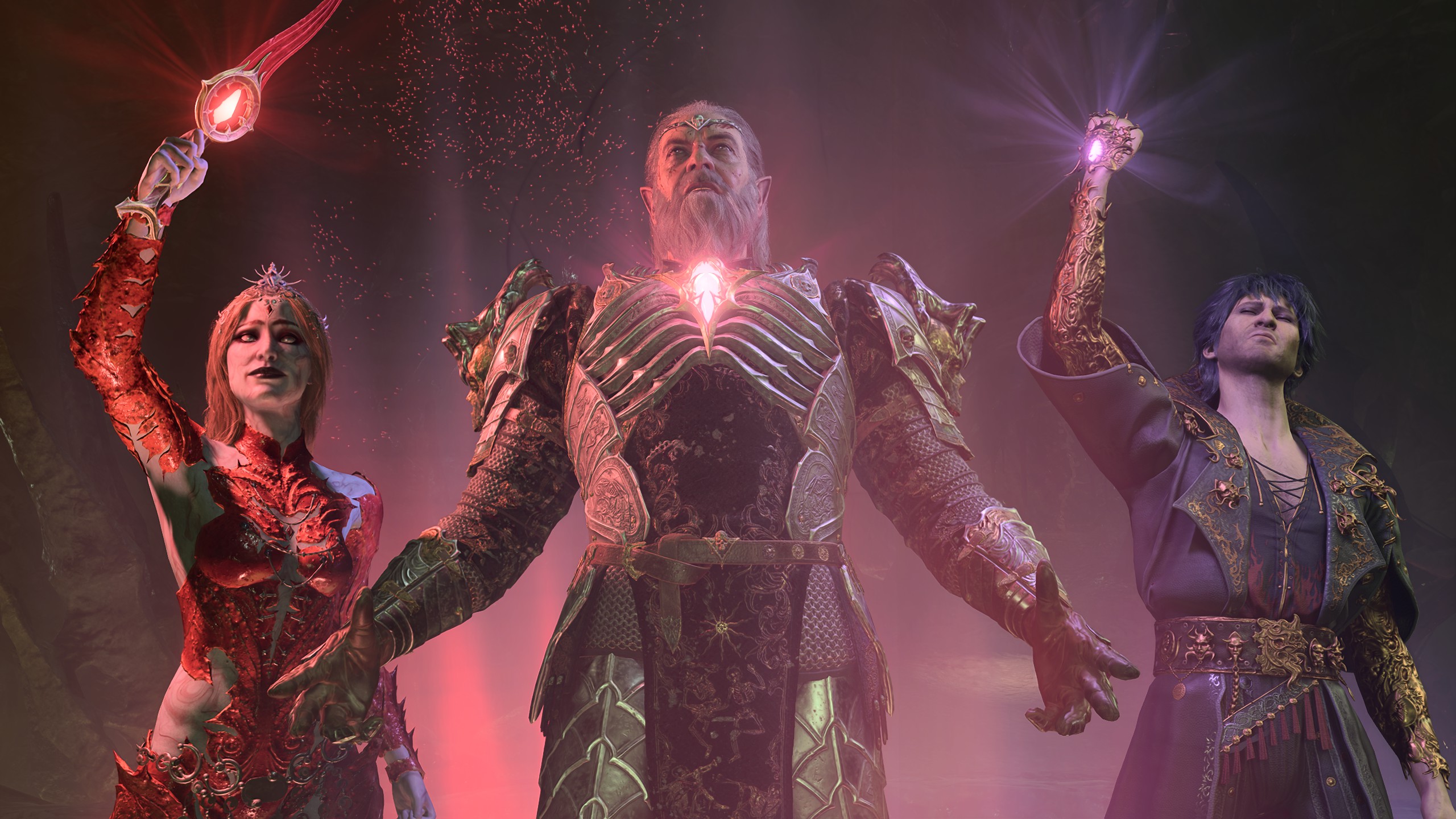Our Verdict
Baldur's Gate 3 is an unrivalled RPG that will swallow your life whole.
PC Gamer's got your back
What is it? A D&D romp through the Forgotten Realms.
Release date August 3, 2023
Expect to pay £50/$60
Developer Larian Studios
Publisher Larian Studios
Reviewed on RTX 4090, Intel i9-13900k, 32GB RAM
Steam Deck Verified
Link Official site
After spending 160 hours unravelling conspiracies, setting fire to monsters and finding increasingly fancy hats for my Bard, I can now confidently say that Baldur's Gate 3 is the greatest RPG I've ever played. If I wasn't writing this review, I'd be rolling a brand new character and jumping in for another hundred hours. I've got it bad.
It's my dream game: the best parts of Ultima, Baldur's Gate, Planescape: Torment, Arcanum: Of Steamworks and Magick Obscura and Divinity: Original Sin. But it also does so much more than tap into the RPG Greatest Hits, finding a way to unite disparate philosophies like cinematic storytelling, unhinged sandbox mayhem and tabletop-style roleplaying. Yes, it says, you can have your cake and eat it too.
And boy is it absolutely massive, as deep as it is wide. Each of the three acts could be their own epic RPG, jam-packed with elaborate dungeons, strikingly memorable quests and unique stakes, supported by systems that offer a truly intimidating amount of player freedom. It is a game overflowing with crossroads, with every step conjuring up yet more paths trying to seduce you off the beaten track.
Venture forth
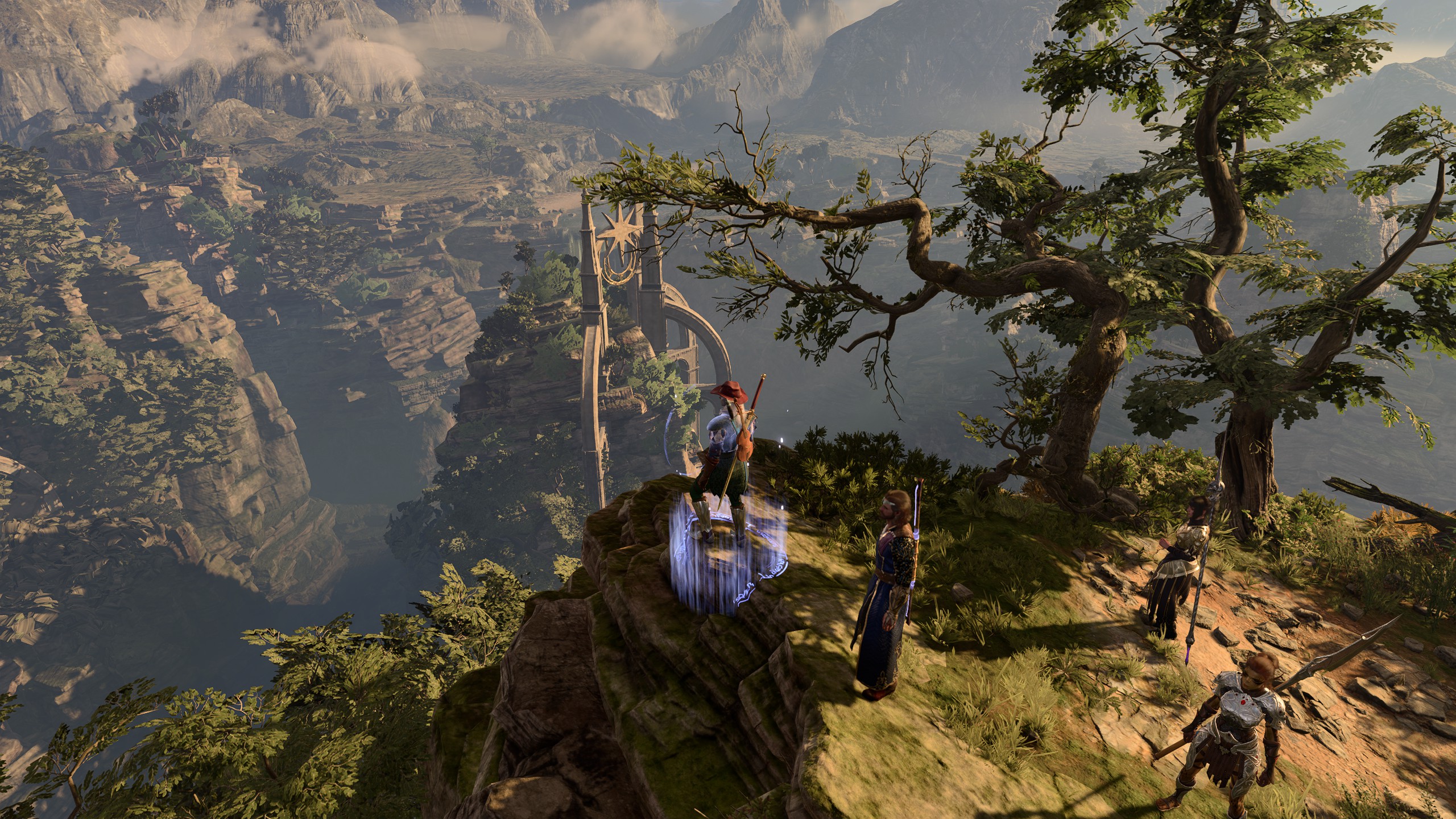
The opening act sees you wrestling with the revelation that you've been infected with a parasite—a tadpole—that will eventually transform you into a monstrous mind flayer, stripping away your identity and free will as you become an agent of the Grand Design, attempting to bring about a universe where everyone is an evil squid monster. But that initial shock quickly makes way for a free-wheeling wilderness adventure evocative of classic D&D escapades.
There's a Druid grove in peril, goblins everywhere, a mysterious swamp and the opportunity to adopt an owlbear cub. Please do—it's adorable. It's here that you'll meet the majority of your companions, who share your mind flayer curse, letting you fill out your party to better tackle the dangers of the Sword Coast. This is Baldur's Gate 3 at its most traditional, but even so it pushes against the familiar, using things like the lurking danger—and allure—of the tadpole to keep you on your toes. It bestows you with some of the powers of a mind flayer, you see, and encourages you to use them, manipulating your allies and enemies, with the promise of even more exotic powers should you give in.
With each act, there's not just a change in location but a change in tone as well. Act 2 has the most dramatic turn, with its shift into pure horror, all curses and twisted monsters and traumatised NPCs. There are shades of Dark Souls and Bloodborne here, laden with an oppressive atmosphere and some truly unsettling creature designs. It's a welcome but harrowing change in direction. But so much of the game's tone is down to your choices. In Act I, for instance, you might team up with the villains of the moment, butcher all the heroes and innocents, and completely change the whole act's vibe. You might not always know what story you're writing, but you're always its author.
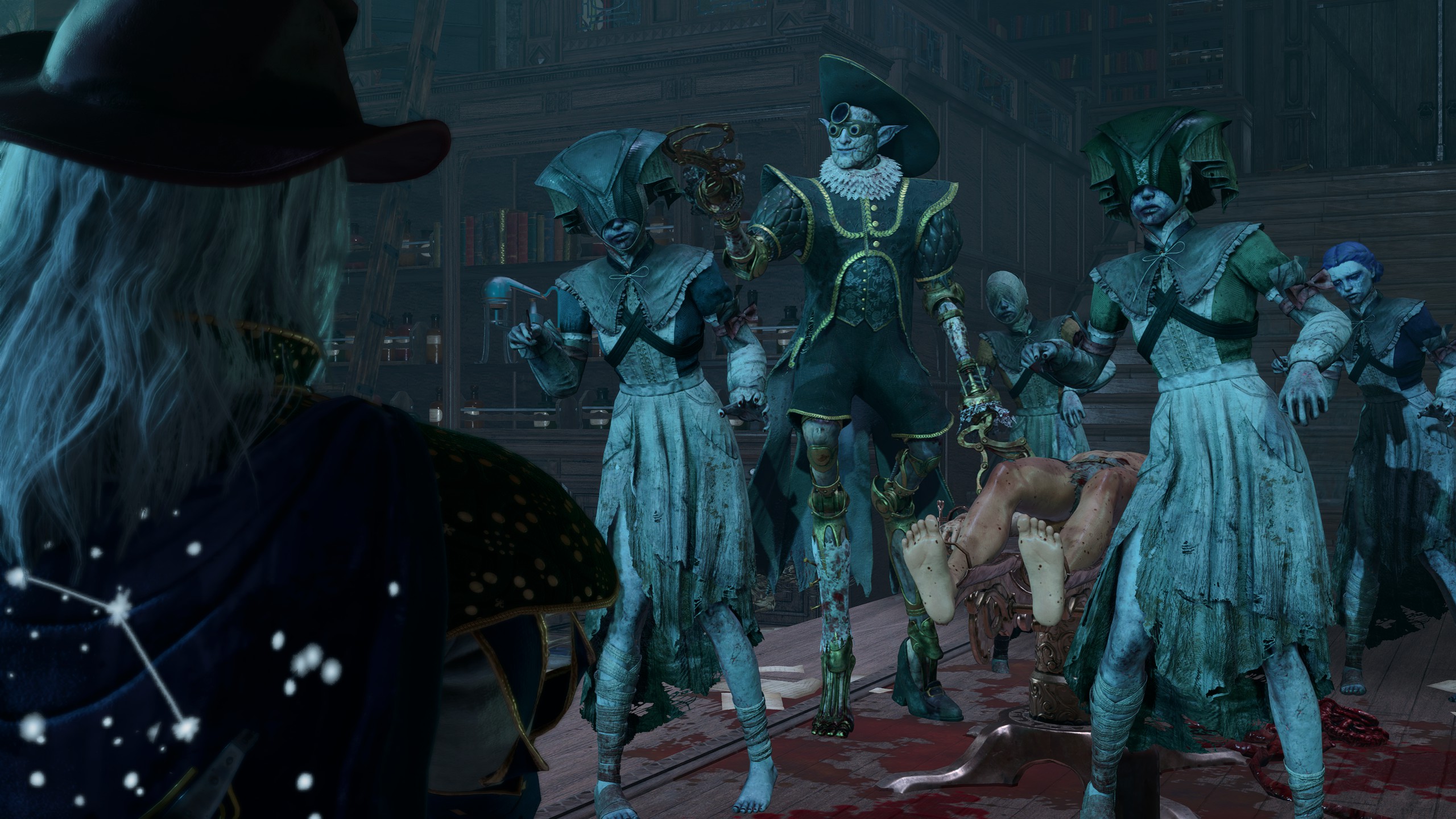
Horror is always waiting in the wings no matter what act you're adventuring in. Once I reached Baldur's Gate itself, in Act 3, I spent a good chunk of time trying to find the dismembered body parts of a murdered clown, in a quest that started off full of laughs and quickly veered into the horrific. But this urban setting also provided its own unique adventures full of political intrigue and criminal turf wars. The relentless variety of the quests feels like 10 different tabletop campaigns combined, but Larian manages to keep things surprisingly cohesive, weaving hundreds of disparate threads together.
Though each is distinctive, it's impressive how much carries over from act to act, depending on your actions. Seemingly throwaway characters met in the opening hours can end up playing incredibly important parts of the overarching story, cropping up all over the place. This is especially true of the band of refugees you meet near the start of the game, who you'll bump into again and again, leaving a significant mark. Unless of course they all end up dead within the first 20 hours thanks to your actions (or your inaction), dramatically changing the flavour of the whole adventure. The ramifications of your choices are always evident and often monumental.
Friends for life
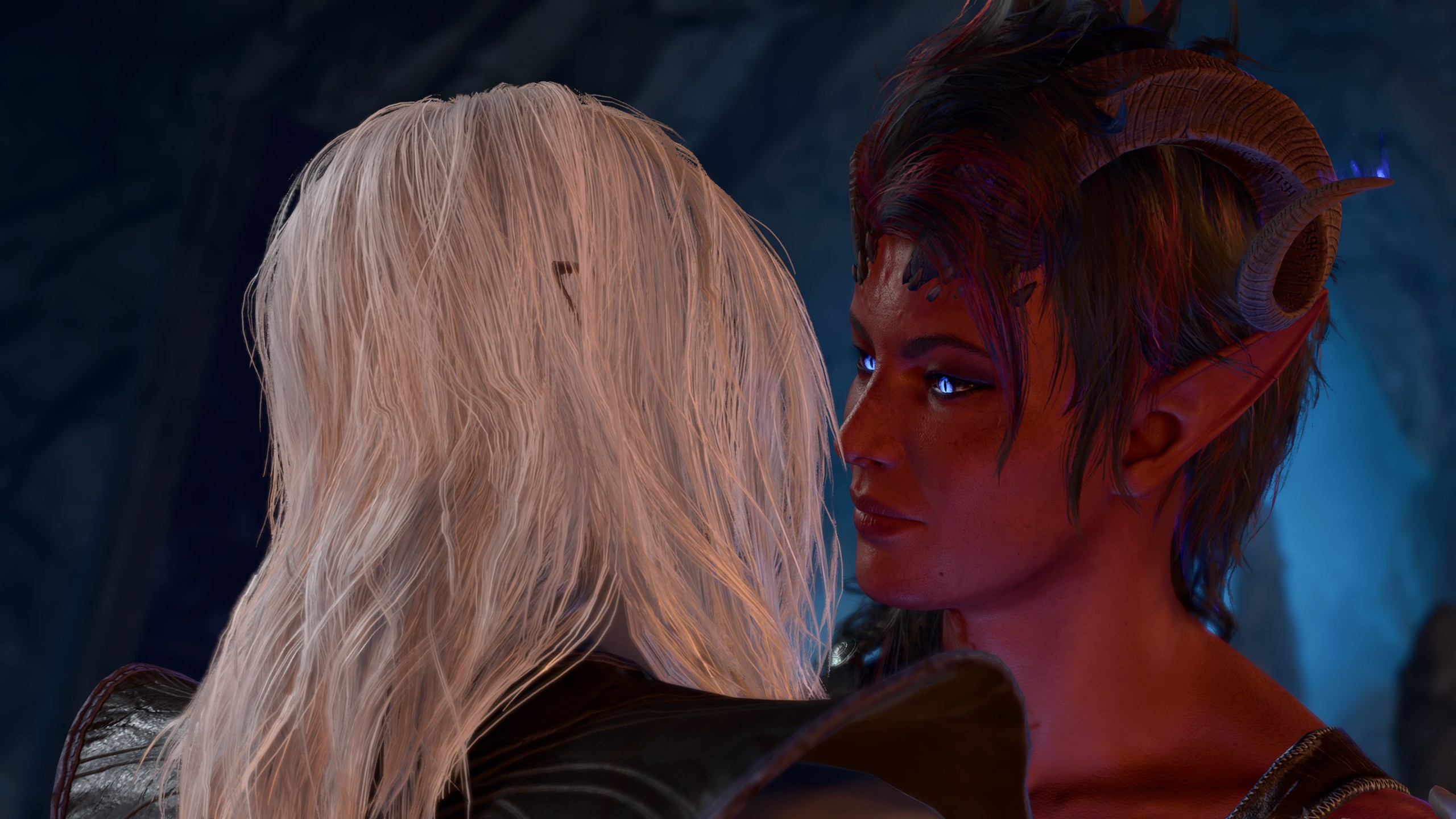
The epic stakes are balanced out by the multitude of very intimate, personal stories—ones that are elevated by writing that never falls into the fantasy trap of becoming stiff or stuffy. The fate of the entire world hangs in the balance, but that's very much par for the course. Larian's writers make this matter by blessing the world with a bounty of rich characters who you'll inevitably become invested in as you spend hundreds of hours getting to know them.

Baldur's Gate 3 guide: Everything you need
Baldur's Gate 3 tips: Be prepared
Baldur's Gate 3 classes: Which to choose
Baldur's Gate 3 multiclass builds: Coolest combos
Baldur's Gate 3 romance: Who to pursue
Baldur's Gate 3 co-op: How multiplayer works
Even though you have a great deal of control over what happens to your companions, they have a lot more agency than your usual RPG party members, including when it comes to romance, where they're usually the ones to instigate the change in your relationship. They have arguments and disagreements and agendas that are at odds with each other. And they never feel like they're just playing a supporting role. Their personal quests—each chock full of tragedy and conflict—are inextricably linked to the main quest, and every companion is treated as just as important as the player character. It's their story just as much as it's yours. Indeed, you can optionally play the entire game from their perspective, selecting them as an "origin character" during character creation—though I recommend a custom character for your first playthrough.
One of my highlights was simply going on a cheesy date at a frankly terrible restaurant with Karlach, the tiefling Barbarian whose supernatural might is fuelled by an Infernal Engine in her chest. A quiet, incredibly sweet moment between intensely violent fights against gods and demons and mind flayers. Baldur's Gate 3 is a very horny game, but it can also be genuinely romantic and nuanced. The relationships you encounter, both sexual and platonic, are complex, believable things, and miraculously manage to feel grounded even when magical WMDs, affairs with deities and pacts with devils are involved.
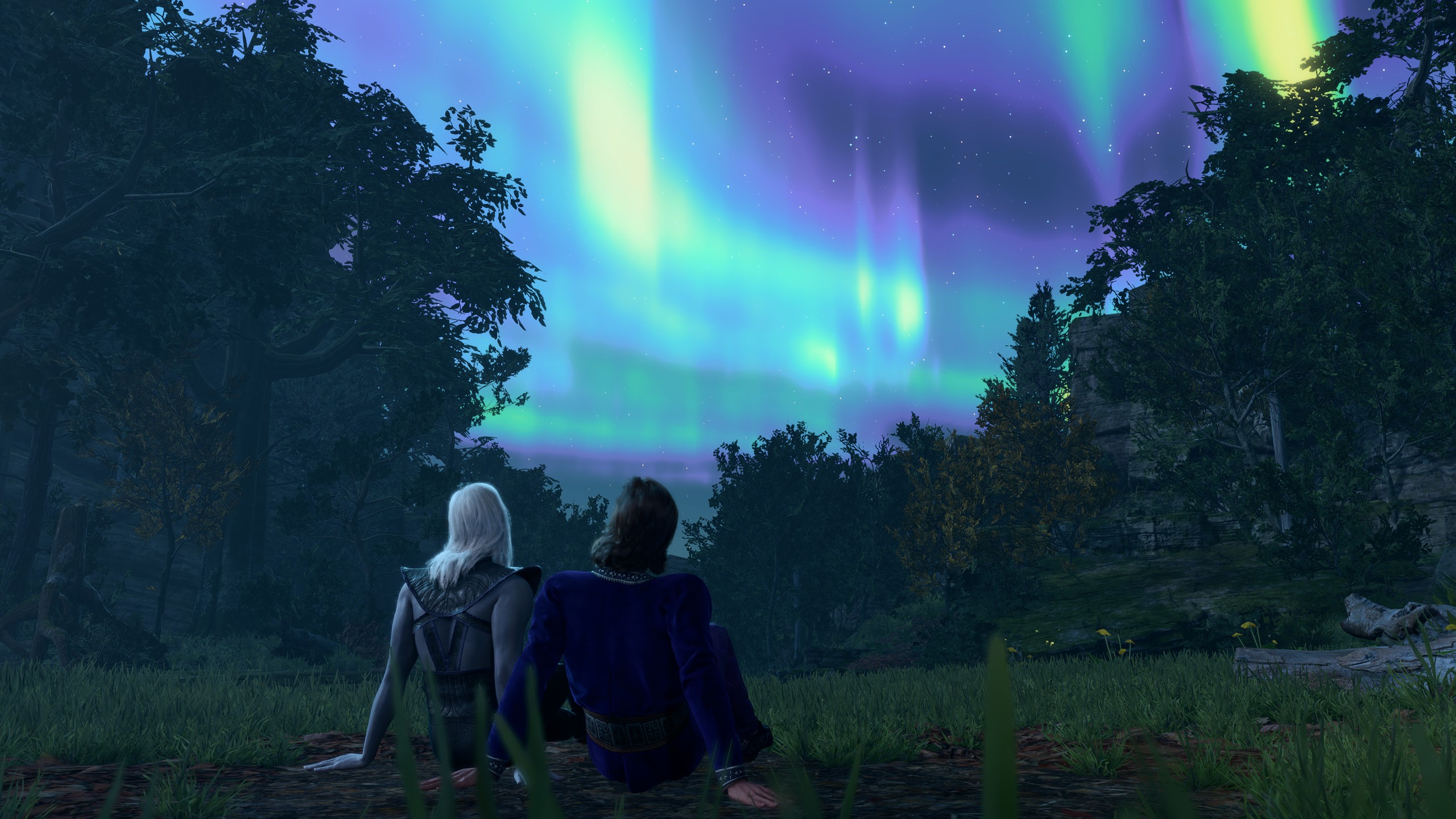
Every companion's arc is worth exploring—even the ones you initially don't care for. I found Wyll the Warlock a big ol' bore at first, but after supporting him through all of his trials, helping him reconnect with his father and watching him overcome his demons, I couldn't imagine him not being in my party. Flirty Wizard Gale, meanwhile, seemed like a liability at first, but eventually became my most stalwart companion. I even felt guilty when I had to knock him back during a date, but that opened the door to a strong platonic friendship. Now that I'm done, I miss them all.
The rest of the game's gargantuan cast are treated similarly—it's full of multi-faceted, interestingly flawed characters who add humanity to the fantastical quests they are attached to. And since so many of them have the potential to stick around right up until the end, there are so many opportunities for growth, in turn making the Sword Coast feel like a tangible, constantly evolving place.
Anything goes
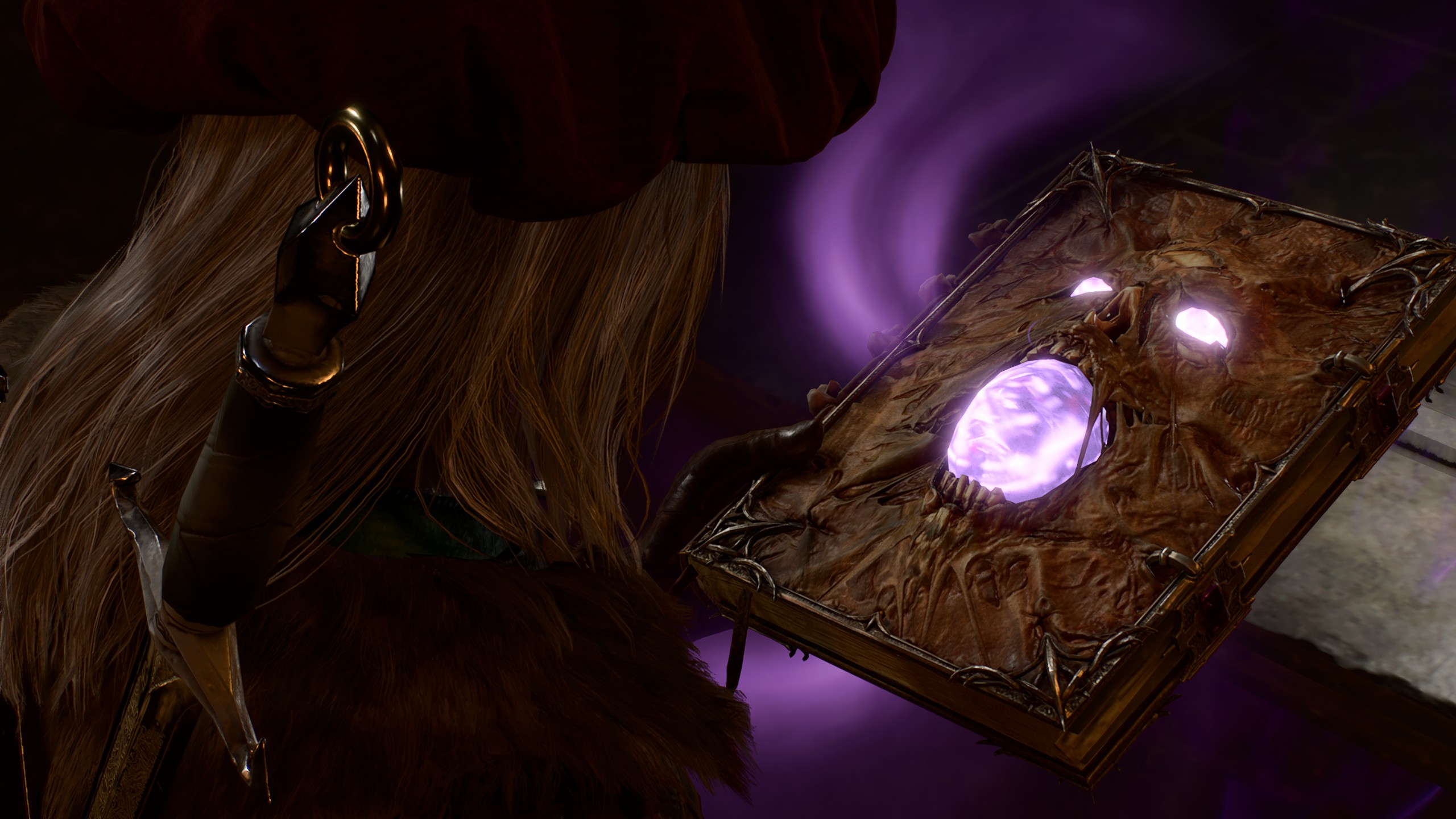
It's made even more tangible thanks to the absurd level of interactivity. Baldur's Gate 3 fully embraces the flexible nature of D&D, turning it into an immersive sim where, if you can imagine it, you can probably do it. Every quest, puzzle and combat encounter has a ridiculous number of ways for you to tackle it, rewarding creativity and curiosity at all times. Every time I thought "It will never let me do this", I was proven wrong, with no cheesy tactic or exploitative loophole deemed out of bounds.
Spells, skills and physical manipulation of the world around you opens up so many doors, literally and metaphorically. You can make a fight against a trio of ogres go your way by smashing the rickety pillars holding up the building they're hanging out in, turn into a gas to sneak your way through tiny cracks in a wall, or use magic to persuade animals to turn on their masters. You might never talk to a single squirrel, but every animal in this humongous game has dialogue. You can read minds, talk to the dead, create magical disguises, turn invisible and teleport yourself and allies across large distances, and these tricks can be used time and time again rather than just as one-off novelties.
This is a game where something as innocuous as an empty box can become the linchpin in your strategy.
This is a game where something as innocuous as an empty box can become the linchpin in your strategy as you move it around to reach places above you, neutralise poison-spewing vents or just drop it on top of an unsuspecting enemy. Everywhere you look there are opportunities to feel like the smartest person in the room.
As a Dungeon Master, developer Larian Studios is very permissive, though occasionally brutal. Experimentation is encouraged, but mistakes often lead to death. And this flexibility works both ways, with enemies also able to take advantage of your dirty tricks. So while you might be able to knock back a strength potion and push a boss off a cliff, ending an elaborate fight before it even starts, your whole party can also be knocked into oblivion. Just watch out for those sudden drops.
High roller
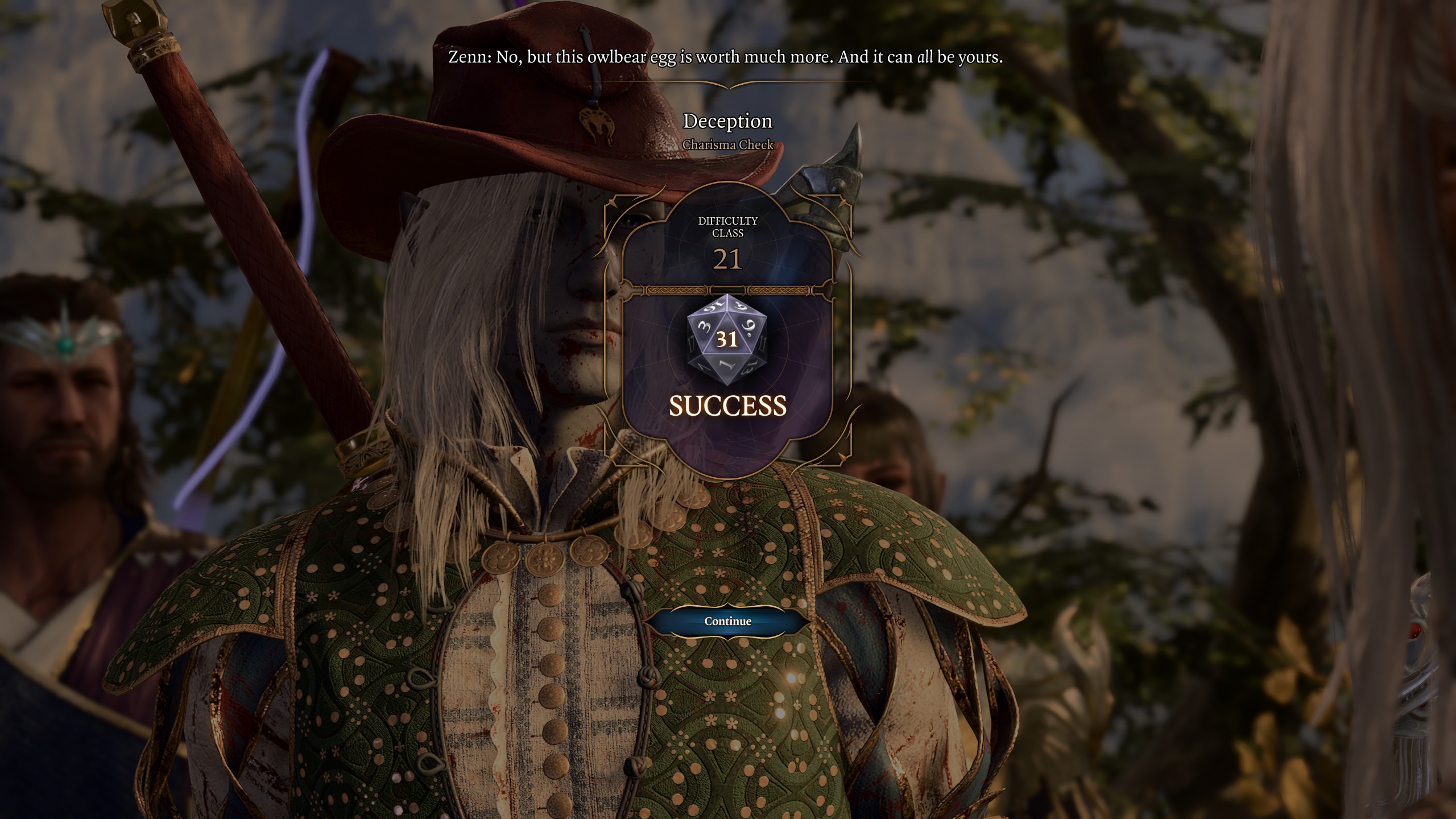
The spirit of D&D has been captured not just by Baldur's Gate 3's flexibility, but by its love of dice rolls as well. As you explore the world, passive rolls will constantly be made against your perception skill, to determine if you've noticed a trap, a potential ambush or some buried treasure. Thankfully, even if your player character misses something, the rest of your party might be more alert.
You'll be doing a lot of manual rolls, too, like when you're trying to pick a lock, disarm a trap, or just in conversation. The skills you get when you select your class and background constantly crop up, emphasising your earliest choices and encouraging you to roleplay. Sometimes you'll get unique dialogue options that don't require any rolls—as a Bard I often get to crack jokes or spit out the occasional bit of poetry—but when I try to persuade or deceive someone, the dice come out. The mechanic is pleasingly tactile, and I've never felt so tense about making conversation choices before. It's brilliant and stressful and I'm no longer certain I can make decisions in my own life without dice now.
RNG can be a bit of a pain in the arse, true, but Baldur's Gate 3 sidesteps some of the pitfalls inherent in systems that employ so much randomness by giving you plenty of ways to augment your rolls. Spells, potions and proficiency bonuses can be applied to bump the number up, with your companions lending a hand too. It always feels like you're still in control. By making choices that match your chosen background, and those of your companions, you can also get Inspiration points, letting you reroll and take another swing of the bat. Roleplaying, then, brings with it real rewards.
Powergaming
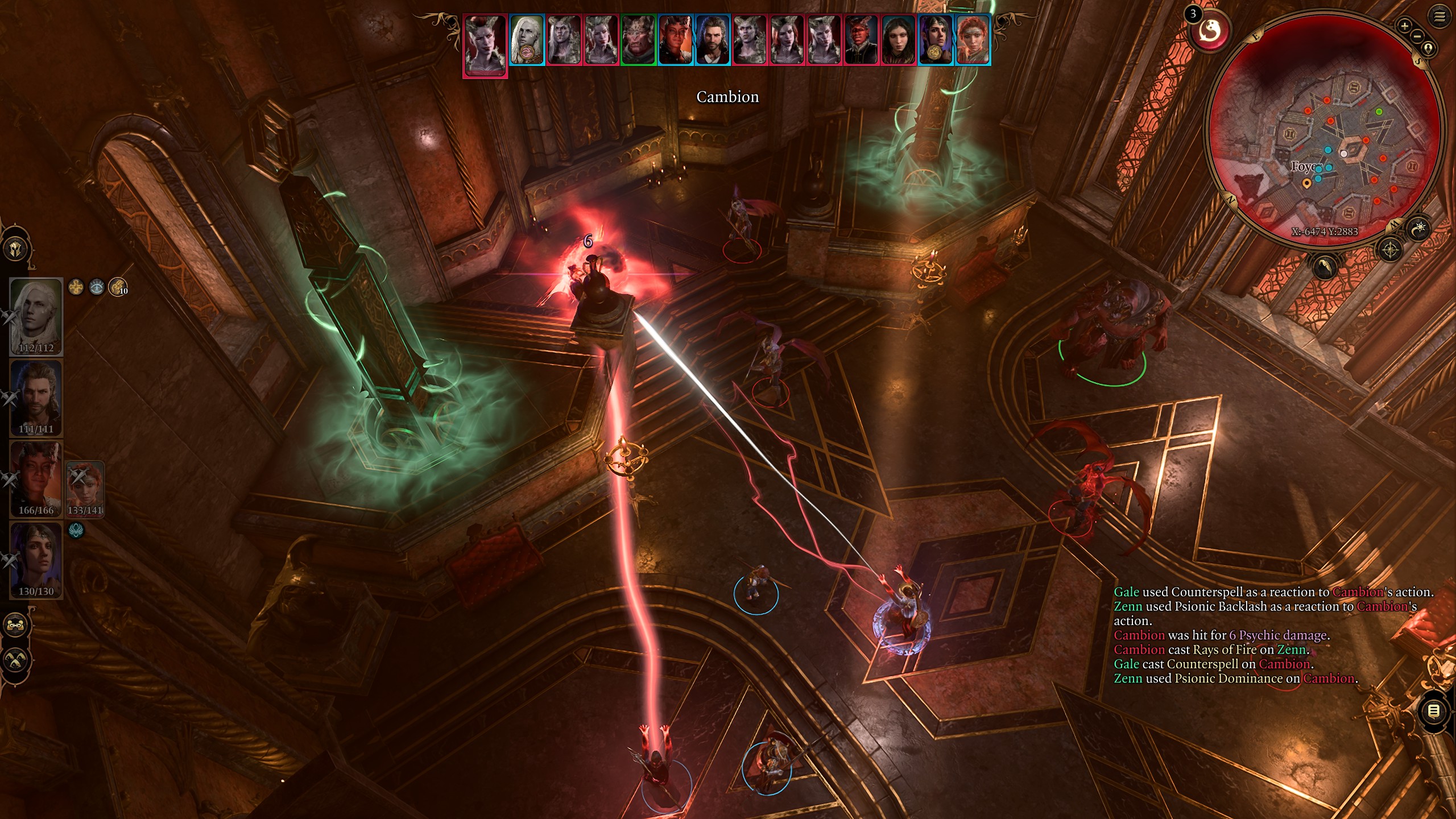
Compared to a lot of other RPGs, Baldur's Gate 3 has a fairly low level cap. 12 levels doesn't sound like a lot, especially when you often won't actually be making any choices when you do level up. But this is less of an issue when you consider the vast amount of other ways you can develop your character.
The sheer number of magical items you'll encounter in your playthrough is enough to fill every shelf in Sorcerous Sundries, Baldur's Gate's premier magical shop, a hundred times over. And many of them give you new spells and skills, completely changing your build. After finding a lot of lightning-themed gear I turned Gale into an invincible, electricity-spewing bomb who could just walk through the battlefield spitting out death while being completely immune to the fallout. He never left my side after that. There are even multiple times where you can voluntarily undergo surgery to give yourself weird new powers, like the ability to inherently detect invisible enemies.
The sheer number of magical items you'll encounter in your playthrough is enough to fill every shelf in Sorcerous Sundries, Baldur's Gate's premier magical shop.
I'm not much of a min-maxer, especially not in story-driven RPGs, but Baldur's Gate 3 makes experimenting with weird builds an absolute delight. For me it's not so much about making tiny changes to squeeze a bit more damage here or there, but rather playing around with items and spells to see what sort of mayhem I can cause. And boy is there a lot of potential for mayhem. Who needs extra levels when you can shapeshift into an owlbear, cast the Enlarge spell, and then drop onto an enemy from a great height, transforming into an earth-shattering meteor?
Thanks to a character who you'll meet early on, you can respec or completely change your class for a small fee, and the same goes for your companions, so there's nothing stopping you from turning Baldur's Gate 3 into your own little laboratory—unless your coin purse is full of moths.
Murder and mayhem
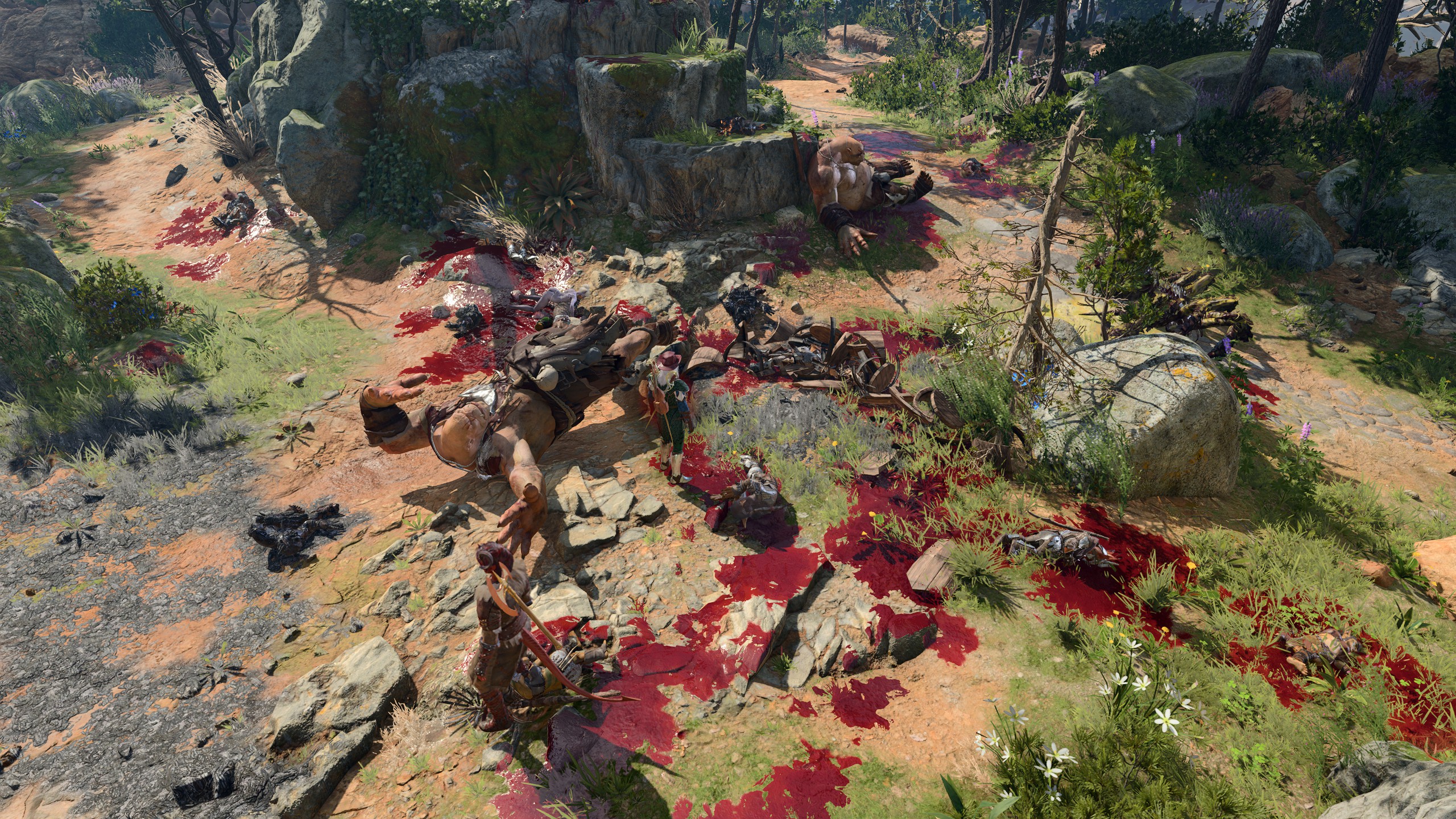
If it wasn't obvious from the whole owlbear meteor thing, Baldur's Gate 3's fights are wonderfully anarchic. It's a turn-based deal (outside of combat it's real-time by default, but with the option to switch to turn-based when you, say, want to perfectly time a sneaky infiltration of a monster-filled ruin) and is thus a bit slower than its predecessors when blood's getting spilled. It's also so much better.
Every scrap is an experimental, free-form puzzle filled to the brim with things to be fiddled around with: terrain, props, elemental effects, even the corpses can be weaponised. If you've never murdered a devil by throwing a dead gnome at it, you haven't lived. If you want, you can even charge into battle with a sausage pilfered from a tavern kitchen. But it's a joy even when you're not experimenting. Simply thwacking goblins with a big ol' sword is immensely satisfying, especially as you grow in power, going from a level 1 fighter who keeps missing their hits to a level 12 god-killer who can just keep swinging away multiple times a turn. Spellcasters, meanwhile, start with a small but handy assortment of tools, but after only a few levels you'll have a lot of flashier options, and tricks with so much utility both in and out of combat.
Larian has made the familiar roster of D&D spells and powers impressively flexible tools, especially in the way that they interact with the battlefields themselves. Instead of just firing Melf's Acid Arrow at a gnoll, you can instead fire it at the ground they're standing on, making the surface acidic. Then you can follow it up with Firebolt, which combines with the acid to create a fiery explosion. This is the system at its most basic, and as you unlock more elaborate spells things really kick off, allowing you to create massive AoE traps that can take out small armies.
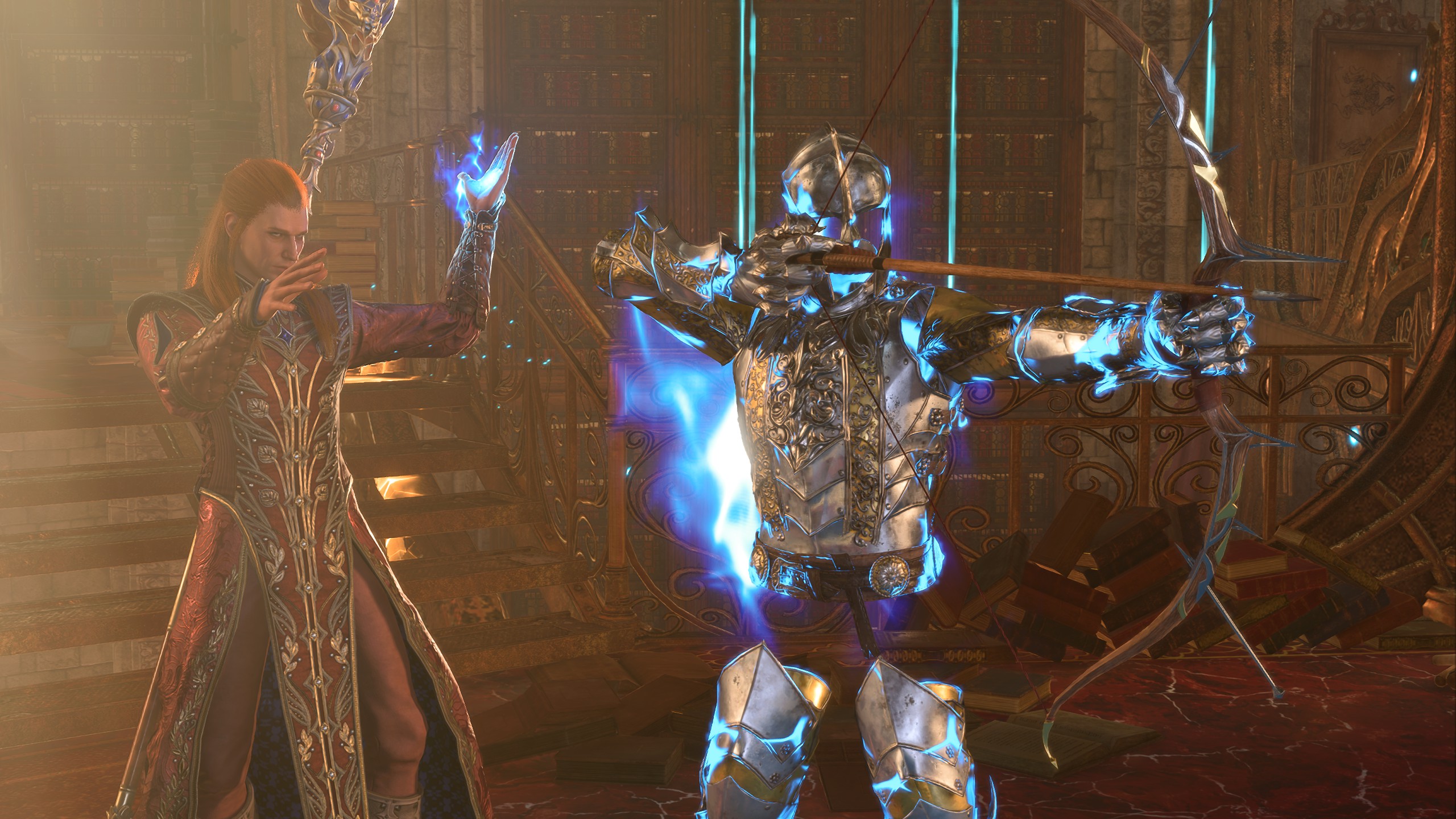
Then you've got all of your reactions, which allow you to, among other things, counter attack, as well as bonus actions like jumping, dipping your weapon into a surface (giving it a flaming effect etc) or pushing idiots over. So you can get acid all over your blade, jump up to an enemy above you, push them off a cliff, and then start melting their mates. You can also throw any random objects from your inventory, or find things scattered around the battlefield itself. I especially love to sneak around before I've been spotted and drop a boulder, a hanging brazier or whatever else I can find as an opening to combat. It just makes me deliriously happy to start a fight by instantly crushing some fools.
Some encounters are going to stick with me for a long time. There are all the fights against veritable armies that I went into entirely unprepared, of course, resulting in hours of shouting and then joyous cheers when I finally figured out the sneakiest ways to win them. Then there was the time when I had only a handful of turns to rescue a bunch of folk from an exploding prison while fish-people with nets tried to slow me down and murder me. I spent a whole night figuring that one out. And until the day I die I will never forget the boss fight with a musical accompaniment performed by the boss himself. He had a lovely voice and I'm sorry I killed him.
Trials and tribulations
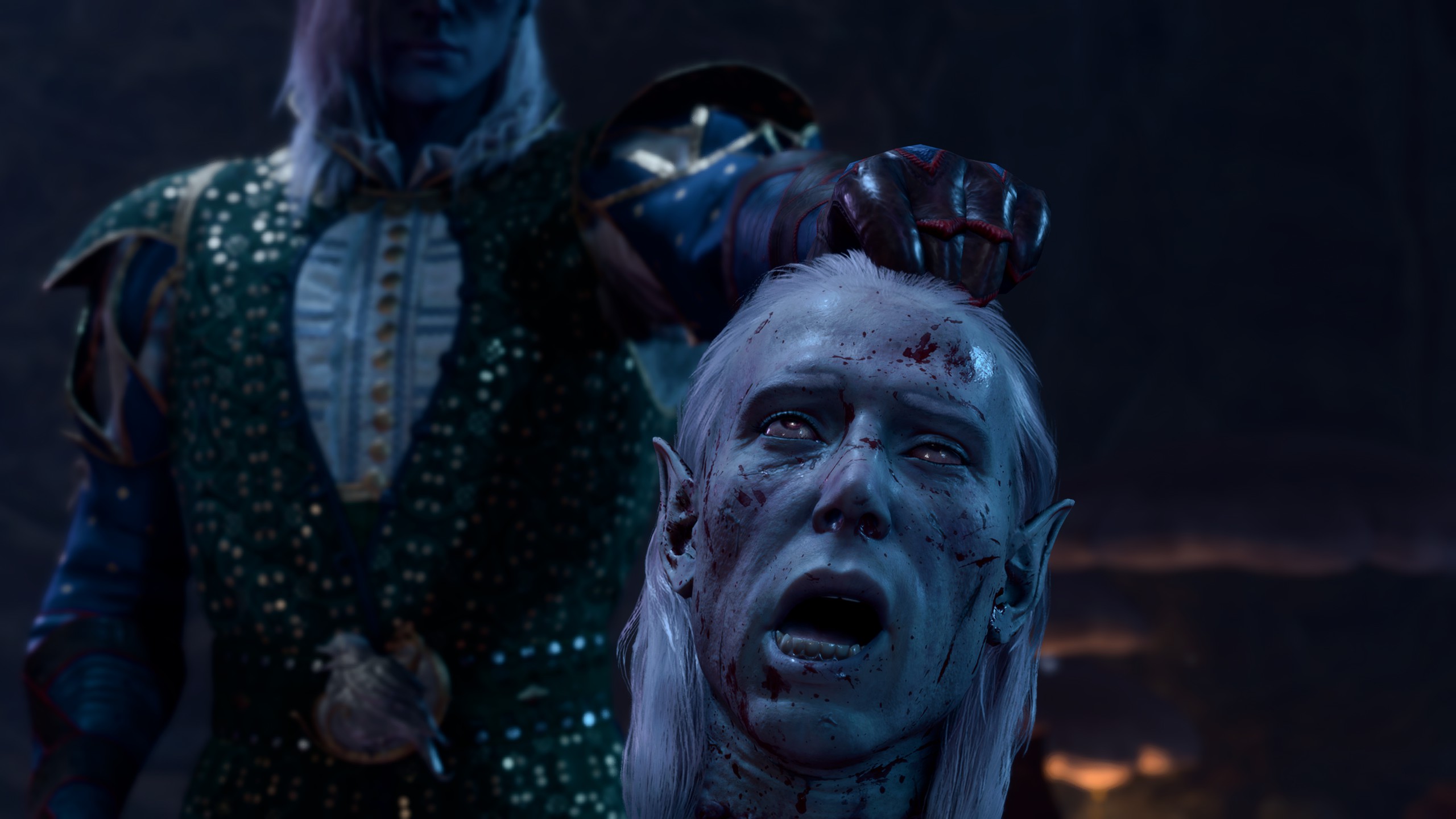
Embarking on this adventure can be pretty daunting, granted. D&D can be impenetrable for the uninitiated, and Baldur's Gate 3 is not an easy-going introduction to its rules and quirks. Even as a Baldur's Gate vet who also plays tabletop RPGs, I found it quite intimidating, and a lot of folk at PCG ended up starting the game again after 20 hours. It demands a lot of patience, then, and you might have to spend a lot of those early hours just figuring things out and muddling through. Once you've figured out D&D's eccentricities, though, you'll have a much better time.
Keeping track of characters and quests can also be a real challenge, even with the quest journal helping. Sometimes the passage of time will lock you out of certain quests, but on other occasions it won't. I spent hours trying to access a location before moving onto the second act because of a pop-up implying that I was reaching a point of no return, only to discover that the location was in a different act, and that I could still return anyway, at least until an entirely different point of no return. It gets confusing! The best way to avoid getting caught out is by saving way more than you think you'll need to—just in case.
Embarking on this adventure can be pretty daunting.
Given the scope and complexity, though, I honestly expected to encounter more issues. I noticed a few minor bugs and one crash, but no problems since Larian started releasing hotfixes. Performance has been similarly smooth, though with an RTX 4090 and an i9 13900K, I'd be worried if it wasn't. On Steam Deck things were more iffy, but I'll happily deal with 20-30 fps if it means I can play in bed.
After reviewing a game this ridiculously large, there's usually a sense of relief when I'm done. But not here. To be honest, I could have easily reached the game's climax days earlier, but I just couldn't bring myself to call it. I felt compelled to see as much as humanly possible in one playthrough because it's all just so bloody incredible. Whenever I found a new quest to distract me, I was overjoyed. Another reason to keep playing! More of the best-in-class writing, more of these gripping fights that have seen me duking it out well into the small hours of the morning, more magical artefacts to cram into my beautiful mess of an inventory. I'm genuinely gutted that it's over. So I guess there's only one solution: start all over again. I'm buzzing with excitement.
Baldur's Gate 3 is an unrivalled RPG that will swallow your life whole.

Fraser is the UK online editor and has actually met The Internet in person. With over a decade of experience, he's been around the block a few times, serving as a freelancer, news editor and prolific reviewer. Strategy games have been a 30-year-long obsession, from tiny RTSs to sprawling political sims, and he never turns down the chance to rave about Total War or Crusader Kings. He's also been known to set up shop in the latest MMO and likes to wind down with an endlessly deep, systemic RPG. These days, when he's not editing, he can usually be found writing features that are 1,000 words too long or talking about his dog.
